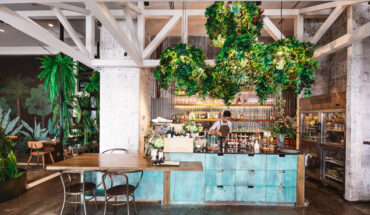As the world becomes increasingly aware of the environmental impact of daily habits, the café culture in Brisbane is evolving to embrace sustainability. From zero-waste practices to eco-friendly products, Brisbane’s cafes are leading the charge in creating a more sustainable future. This post explores some of the most notable initiatives and how they are reshaping the city’s vibrant café scene.
Zero-Waste Cafes: A Growing Trend
One of the most significant movements in Brisbane’s café culture is the rise of zero-waste cafes. These establishments prioritise reducing waste in every aspect of their operations, from sourcing ingredients to serving customers.
 Example: The Source Bulk Foods
Example: The Source Bulk Foods
The Source Bulk Foods in West End is a pioneer in the zero-waste movement. This café offers a variety of bulk foods, encouraging customers to bring their own containers to reduce packaging waste. They also provide compostable packaging for those who forget their containers. The café’s commitment to sustainability extends to its menu, which features locally sourced, organic ingredients, and plant-based options.
Benefits of Zero-Waste Practices
Zero-waste practices not only reduce the environmental footprint of cafes but also inspire customers to adopt more sustainable habits. By demonstrating how simple changes can make a big difference, these cafes are fostering a culture of sustainability in Brisbane.
Sustainable Sourcing: Supporting Local and Organic
Another key initiative among Brisbane’s cafes is sustainable sourcing. By choosing local and organic ingredients, these cafes support local farmers, reduce their carbon footprint, and provide healthier options for their customers.
 Example: Nodo Donuts
Example: Nodo Donuts
Nodo Donuts, with locations in Newstead and South Bank, is a prime example of a café committed to sustainable sourcing. Their menu is free from gluten and artificial additives, featuring ingredients sourced from local farmers and producers. This not only ensures the freshness and quality of their products but also supports the local economy and reduces food miles.
The Impact of Local Sourcing
Sourcing locally helps to reduce greenhouse gas emissions associated with transportation and storage. It also strengthens the local economy by supporting small-scale farmers and producers. For customers, it means enjoying fresher, more nutritious food while contributing to a more sustainable food system.
Eco-Friendly Packaging: A Shift Towards Compostable and Reusable
Single-use plastics have long been a staple in the food and beverage industry, but Brisbane’s cafes are making significant strides in reducing their reliance on these materials. Eco-friendly packaging is becoming the norm, with many cafes adopting compostable or reusable options.
 Example: The Green Edge
Example: The Green Edge
The Green Edge in Windsor is a vegan café that has taken substantial steps towards reducing plastic waste. They use compostable packaging for takeaway orders and offer discounts to customers who bring their own reusable cups and containers. The café also sells a range of eco-friendly products, from reusable straws to bamboo cutlery, encouraging customers to make sustainable choices in their everyday lives.
Advantages of Eco-Friendly Packaging
Switching to eco-friendly packaging reduces the amount of plastic waste that ends up in landfills and oceans. Compostable materials break down naturally, returning nutrients to the soil, while reusable options help cut down on the production of new materials. For cafes, these initiatives not only reduce their environmental impact but also appeal to environmentally conscious customers.
Energy Efficiency: Powering Cafes with Renewable Energy
 Energy consumption is a significant concern for cafes, which require a substantial amount of power for cooking, lighting, and heating. Many of Brisbane’s cafes are addressing this issue by incorporating renewable energy sources and energy-efficient practices into their operations.
Energy consumption is a significant concern for cafes, which require a substantial amount of power for cooking, lighting, and heating. Many of Brisbane’s cafes are addressing this issue by incorporating renewable energy sources and energy-efficient practices into their operations.
Example: The Coffee Commune
The Coffee Commune in Bowen Hills is a café and community space dedicated to sustainability. They have installed solar panels to power their operations and use energy-efficient appliances to reduce their overall energy consumption. The café also hosts workshops and events to educate the community about sustainable living and renewable energy.
The Role of Renewable Energy
Using renewable energy sources like solar power helps to reduce greenhouse gas emissions and reliance on fossil fuels. Energy-efficient practices, such as using LED lighting and energy-saving appliances, further decrease a café’s carbon footprint. For cafes, these measures can also result in significant cost savings over time.
Community Engagement: Educating and Inspiring Change
 Many of Brisbane’s cafes are not only implementing sustainable practices but also actively engaging with their communities to promote environmental awareness and inspire change.
Many of Brisbane’s cafes are not only implementing sustainable practices but also actively engaging with their communities to promote environmental awareness and inspire change.
Example: Wandering Cooks
Wandering Cooks in South Brisbane is a hub for local food entrepreneurs and a champion of sustainability. They provide resources and support for small food businesses, helping them to adopt eco-friendly practices. The café also hosts regular events and workshops focused on topics like zero waste, sustainable sourcing, and reducing food waste, creating a platform for community learning and engagement.
The Power of Community
By engaging with their communities, cafes can amplify their impact and foster a collective commitment to sustainability. Education and awareness are crucial in driving long-term change, and cafes are uniquely positioned to serve as leaders and influencers in this regard.
Innovative Menu Offerings: Plant-Based and Sustainable Choices
In response to the growing demand for sustainable food options, many of Brisbane’s cafes are expanding their menus to include more plant-based and environmentally friendly choices.
 Example: Charlie’s Raw Squeeze
Example: Charlie’s Raw Squeeze
Charlie’s Raw Squeeze, with several locations around Brisbane, offers a menu that is entirely plant-based, featuring smoothies, salads, and raw treats made from locally sourced, organic ingredients. The café’s commitment to sustainability is evident in its use of compostable packaging and its efforts to minimise food waste through creative menu planning and portion control.
Benefits of Plant-Based Menus
Plant-based diets have a lower environmental impact compared to diets high in animal products. They require less water, land, and energy, and produce fewer greenhouse gases. By offering plant-based options, cafes can attract health-conscious and environmentally aware customers while contributing to a more sustainable food system.
Conclusion: The Future of Sustainable Sips in Brisbane
Brisbane’s cafes are at the forefront of a movement towards more sustainable and eco-friendly practices. From zero-waste initiatives and sustainable sourcing to eco-friendly packaging and renewable energy, these cafes are making a significant impact on the environment and the community. As more cafes adopt these practices and engage with their customers on sustainability issues, the future of café culture in Brisbane looks brighter and greener.
By supporting these initiatives and choosing to dine at eco-friendly cafes, customers can play a crucial role in promoting sustainability. Together, we can create a more sustainable future, one sip at a time.




